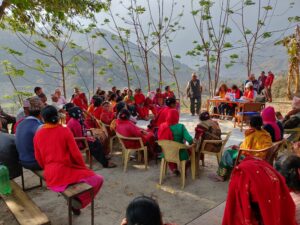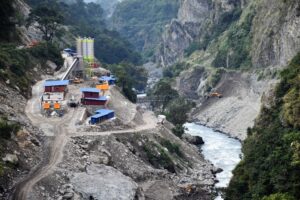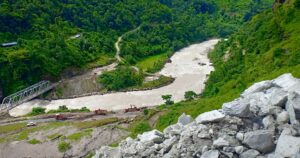New report reveals how government and development banks have failed to uphold Indigenous Peoples rights in hydropower projects across Nepal
 28 April 2025, Kathmandu – A new report, launched today by Accountability Counsel and Lawyers Association for Human Rights of Nepalese Indigenous Peoples (LAHURNIP) exposes critical violations of the rights of Indigenous Peoples to Free, Prior, and Informed Consent (FPIC) in four hydropower projects in Nepal financed by Multilateral Development Banks (MDBs). The report reveals that financial institutions backing up the hydropower projects have fallen short on enforcing their own environmental and social policies, causing irreversible harm to communities and the environment.
28 April 2025, Kathmandu – A new report, launched today by Accountability Counsel and Lawyers Association for Human Rights of Nepalese Indigenous Peoples (LAHURNIP) exposes critical violations of the rights of Indigenous Peoples to Free, Prior, and Informed Consent (FPIC) in four hydropower projects in Nepal financed by Multilateral Development Banks (MDBs). The report reveals that financial institutions backing up the hydropower projects have fallen short on enforcing their own environmental and social policies, causing irreversible harm to communities and the environment.
Based on document analysis and interviews with affected communities, the report “Hanging by A Thread: Indigenous Peoples Rights in Renewable Energy Transition” examines four major hydropower projects in Nepal: Likhu, Tanahu, Upper Trishuli-1, and Upper Arun. Although these projects were all funded by public development banks that require FPIC, a fundamental right of Indigenous Peoples to give or withhold consent on any activities that affect their lands, territories and resources, the report finds that FPIC processes were either entirely bypassed or reduced to performative consultations. These failures have resulted in the dispossession of land, physical and economic displacement, loss of biodiversity and environmental harms, and the loss of cultural heritage, traditional knowledge, and cultural practices for Indigenous Peoples, without their consent. In several cases, communities have also reported facing retaliation for demanding their rights, for instance, detentions, false criminal charges, use of force against peaceful protestors and militarizations of their lands.
In some cases, financial compensation and benefit-sharing programs were equated to a substitute of FPIC. A community leader from the Bhote community, threatened with physical displacement and loss of access to water sources and sacred sites by the Arun Hydropower Project, told the authors: “The allocation of compensation is nothing compared to the cultural and archaeological importance of the ancestral properties, which are linked to our identities… Money is nothing.”

Upper Trishuli Hydropower Project – Credit: LAHURNIP
The report also finds that development banks have continued to finance repeat offenders — project implementers with long records of non-compliance on social and environmental standards — without taking adequate corrective measures. For example, the Accountability Console, a database of community complaints filed with MDBs’ own accountability offices, shows that the Nepal Electricity Authority (NEA) has faced 15 complaints regarding nine MDB-financed energy projects between 1994 and 2024, yet NEA continues to receive new MDB financing without stronger accountability measures in place.
“The due diligence that development banks are required to perform — including direct engagement with communities and field assessments — has been inconsistent at best and entirely absent at worst,” said Sutharee Wannasiri, Communities Associate at Accountability Counsel. “Development banks have not only failed to uphold the commitments they made under their own policies, but in many cases, they have actively enabled the erosion of these protections by repeatedly overlooking alarming records of rights violations and allowing project proponents to act with impunity.”

Arun River Valley. Credit: Dan Kumar Rai/Shutterstock
The report also urges the Government of Nepal to officially recognize Indigenous land rights and ensure that FPIC is upheld as a critical right of Indigenous Peoples when implementing hydropower and other public infrastructure projects.
This report comes at a critical moment. As MDBs aim to position themselves as leaders in financing climate solutions, their legitimacy hinges on their ability to ensure meaningful participation of Indigenous Peoples and deliver development solutions that are sustainable and responsible.
The full report is available in English here.
––
प्रेश विज्ञप्ती नेपालका जलविद्युत परियोजनाहरुका सन्दर्भमा सरकार र विकास बैँकहरुले कसरी आदिवासीका अधिकारहरूलाई सम्बोधन गर्नबाट चुकिरहेको विषयलाई प्रतिवेदनले गरेको उजागर ।
अप्रिल २८, २०२५
[काठमाडौँ, नेपाल] – Accountability Counsel र नेपालका आदिवासीहरुको मानव अधिकार सम्बन्धि वकील समूह (लाहुर्निप) ले विमोचन गरेको प्रतिवेदनले नेपालमा बहुपक्षीय विकास बैँकहरु(MDBs)का लगानीमा नेपालमा सञ्चालित जलविद्युत परियोजनाहरुमा आदिवासीका स्वतन्त्र, अग्रीम जानकारी सहितको मञ्जुरी (FPIC) अधिकारको गम्भीर उल्लंघनको विषयलाई उजागर गरेको छ । प्रतिवेदनले जलविद्युत परियोजनाहरुलाई सहायता प्रदान गरिरहेका वित्तिय संस्थाहरुले आफ्ना वातावरणीय तथा सामाजिक नीतिहरुलाई लागू गर्न असफल रहेको तथ्यलाई समेत उजागर गरेको छ । जसका कारण समुदाय र वातावरणमा अपूरणीय क्षति पुगेको छ ।
दस्तावेजहरुको विश्लेषण एवं प्रभावित समुदायहरुसँगको अन्तर्वार्तामा आधारित “Hanging by A Thread: Indigenous Peoples Rights in Renewable Energy Transition” शीर्षकको प्रतिवेदन नेपालमा सञ्चालित लिखु, तनहुँ, अपर त्रिशुली-१ र अपर अरुण जलविद्युत परियोजनाहरुको विशेष अध्ययन गरेको हो । यी परियोजनाहरुमा आदिवासीका भूमि, भूक्षेत्र र श्रोतहरूलाई प्रभावित पार्ने कुनै पनि गतिविधिहरु सञ्चालन गर्न मञ्जुरी दिने वा रोक लगाउन पाउने आधारभूत FPIC को अधिकारलाई अनिवार्य रुपमा गर्नुपर्ने दायित्व भएका विकास बैँकहरुले लगानी गरेको भएतापनि प्रतिवेदनले त्यस्तो FPIC लाई नजरअन्दाज गरिएको वा परामर्शमा सीमित गरेको अध्ययनले देखाएका छ । परिणाम स्वरूप भूमिसम्बन्धी अधिकार उल्लङ्घन हुने, विस्थापित हुने, जैविक विविधतामा ह्रास आउने एवं वातावरणमा हानी पुग्ने, आदिवासीहरूका मञ्जुरी विना उनीहरुका साँस्कृतिक सम्पदा, परम्परागत ज्ञान एवं साँस्कृतिक अभ्यासहरुमा हानी पुग्नेजस्ता प्रभाव र परिणामहरु निम्तिएका छन् । अधिकांश अवस्थाहरुमा समुदायहरुले आफ्ना अधिकारको माग दावी गर्दा दमनको सामना गर्नुपरेको कुरा बताएका छन् । उदाहरणका लागि, शान्तिपूर्ण विरोध गर्दा बलको प्रयोग हुने, गैरकानूनी थुनामा राखिने, गलत फौजदारी अभियोगहरु लगाईने र सेना परिचालन समेत गर्ने गरेको पाईएको छ ।
केही अवस्थाहरुमा FPIC को बदलामा आर्थिक क्षतिपूर्ति र लाभ-आदानप्रदान कार्यक्रमहरु लागू गरिएका थिए । यस प्रतिवदेनको एक उत्तरदाताका अनुसार ”हाम्रो पहिचानसँग जोडिएका साँस्कृतिक र पुरातात्विक महत्वका पुर्ख्यौली सम्पदाको बदलामा तोकिएको क्षतिपूर्ति केही पनि होईन पैसा नै सबैथोक होईन।”
परियोजनाहरुलाई सहायता प्रदान गर्ने वित्तिय संस्थाहरुमा विश्व बैक, एसियाली विकास बैँक (ADB), एसियाली पूर्वाधार तथा लगानी बैँक (AIIB), यूरोपेली लगानी बैँक (EIB), बहुपक्षीय लगानी ग्यारेण्टी निकाय (MIGA), र जापान अन्तर्राष्ट्रिय सहायता नियोग (JICA) रहेका छन् । प्रतिवेदनले मानव अधिकार तथा वातावरणीय मापदण्डको सम्मान गर्ने सार्वजनिक प्रतिवद्धताका बावजुद सम्भावित र वास्तविक प्रतिकूल प्रभावहरू प्रमाणित गर्न प्रणालीगत रुपमा असफल भएको विषयलाई दस्तावेजीकरण गरेको छ । अधिकांश अवस्थाहरुमा FPIC प्रकृया परियोजना स्वीकृत भईसके पश्चात वा निर्माणका चरणमा सुरुवात भएको छन् जुन बैँकको नीतिहरुको स्पष्ट उल्लंघन भएको अवस्था हो । नेपालका आदिवासीहरुको मानव अधिकार सम्बन्धी वकिल समूह (लाहुर्निप)का अधिवक्ता दुर्गा मणी राई भन्नुहुन्छ, “विकास बैकहरु नेपालका आदिवासीको अधिकारको उल्लंघनमा सहभागी छन् किनभने उनीहरुले जलविद्युत परियोजनाहरुको कार्यान्वयनलाई पर्याप्त ढङ्गबाट सुपरीवेक्षण एवं अनुगमन गर्दैनन् । यसले गर्दा FPIC को उल्लंघनका घटनाहरु उपर निगरानी हुन सकेका छैनन् ।”
प्रतिवेदनले निरन्तर रुपमा गलत कार्य गर्नेहरुलाई विकास बैँकहरुले लगानी गर्ने कार्यलाई निरन्तरता दिने गरेको समेत पाएको छ । जसमा लामो समयदेखि यथोचित सुधारका विधिको अवलम्बन नगरी सामाजिक तथा वातावरणीय मापदण्डको पालना नगर्ने परियोजना कार्यान्वयनकर्ताहरु रहेका छन् । उदाहरणका लागि, Accountability Console को MDB हरुका आफ्ना गुनासो सुन्ने सयन्त्रमा रहेको समुदायको उजुरीसम्बन्धी डाटाबेसले देखाए अनुसार नेपाल विद्युत प्राधिकरण (NEA) मा MDB ले लगानी गरेका नौवटा परियोजनाहरुमा सन् १९९४ देखि सन् २०२४ सम्म कूल १५ वटा उजुरीहरु परेका थिए । यसका बावजुद NEA ले कुनै सुदृढ जवाफदेहीताको विधि अवलम्बन नगरी नै निरन्तर रुपमा MDB बाट नयाँ लगानी प्राप्त गरिरहेका छन् ।
Accountability Counsel का Communities Associate, Sutharee Wannasiri भन्नुहुन्छ, “विकास बैंकहरुले अनिवार्यरुपमा समुदायसंग प्रत्यक्ष संवाद गर्नुपर्ने र स्थलगत अनुगमन तथा मूल्याङ्कन गर्नु पर्ने दायित्व रहेको छ । तर यस्तो भएको देखिन्दैन, यस्ता कार्य कहिले कहीँ गरेको देखिन्छ तर प्रायः यस्तो गरेको देखिन्न । विकास बैंकहरुले आफ्नै नीतिहरु अन्तर्गत गरेका प्रतिवद्घताहरु पालना गर्न असफल भएको मात्र छैनन्, प्राय जसो अवस्थाहरुमा अधिकारहरुको उल्लघंन गरेका गम्भीर घटनाहरुलाई बारम्बार वेवास्ता गरेर तथा परियोजना सञ्चालन तथा समर्थनकर्तालाई दण्डहनिताका साथ काम गर्न अनुमति दिई नीतिहरुले संरक्षण गरेको विषयको क्षयीकरण हुने अवस्था सिर्जना गरेका छन् ।”
यस प्रतिवेदनले स्वच्छ एवं समतामूलक नवीकरणीय उर्जाका परियोजनाहरु सञ्चालन गर्न FPIC लाई कार्यसम्पादन परामर्श वा अनुभव आदानप्रदानमा मात्र सीमित नगर्नका लागि विकास बैँकहरुलाई आह्वान गर्दछ । आदिवासी अधिकारवाला एवं निर्णयकर्ता हुने भएकाले परियोजनाको लगानी सुनिश्चित हुनुअगाडी नै परियाजना संचालनकर्ताले FPIC प्राप्त गर्नुपर्दछ । यसअन्तर्गत अनिवार्य रुपमा स्वतन्त्र र पूर्ण परिपालना, प्रभावित समुदायहरुसँगको अर्थपूर्ण एवं प्रत्यक्ष सहभागिताका साथै समुदायका अधिकारहरुको उल्लंघन भएका बखत समयमा उचित उपचारहरू पर्दछन् । अन्त्यमा, विकास बैँकहरुले सामाजिक तथा वातावरणीय नीतिहरुलाई कडाईका साथ लागू गर्नका लागि लगानी सम्बन्धित विभिन्न शर्तहरु राख्नुका साथै सोको निरन्तर रुपमा पालना गर्न असक्षम परियोजना कार्यान्वयनकर्ताहरुमा लगानी गर्नुपूर्व गम्भीर भएर सोच्नुपर्दछ ।
यस प्रतिवेदनले नेपाल सरकारलाई आदिवासीको भूमिसम्बन्धी अधिकारलाई आधिकारिक रुपमा पहिचान गर्न एवं जलविद्युत परियोजना वा अन्य सार्वजनिक पूर्वाधारका परियोजनाहरु सञ्चालन गर्दा FPIC लाई आदिवासीको महत्वपूर्ण अधिकारका रुपमा सुनिश्चित गर्नका लागि आग्रह गर्दछ ।
यो प्रतिवेदन एक दमै महत्वपूर्ण समयमा प्रकाशित भएको छ । MDBहरुले आफूलाई जलवायु समाधानका उपायहरुमा लगानी गर्ने अगुवाका रुपमा स्थापित गर्ने लक्ष्य लिएकोमा तिनको वैधता आदिवासीको अर्थपूर्ण सहभागिताका साथै दीगो र जिम्मेवार विकासका समाधानहरु प्रदान गर्न सक्ने क्षमतामा निर्भर रहन्छ ।
पूरा प्रतिवेदन अंग्रेजी भाषामा यहाँ उपलब्ध छ।

